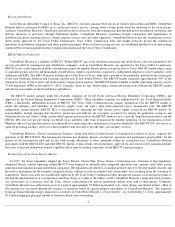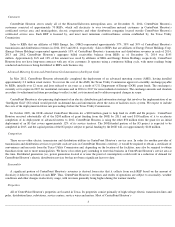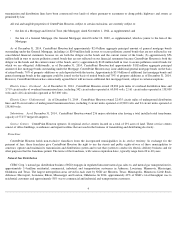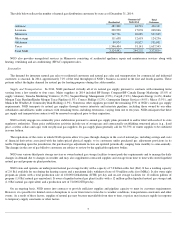CenterPoint Energy 2014 Annual Report Download - page 17
Download and view the complete annual report
Please find page 17 of the 2014 CenterPoint Energy annual report below. You can navigate through the pages in the report by either clicking on the pages listed below, or by using the keyword search tool below to find specific information within the annual report.
Midstream Investments - Rate and Other Regulation
Federal, state, and local regulation of pipeline gathering and transportation services may affect certain aspects of Enable’
s business and the
market for its products and services.
Interstate Natural Gas Pipeline Regulation
Enable’s interstate pipeline systems — Enable Gas Transmission, LLC (EGT), Enable-
Mississippi River Transmission, LLC (MRT) and
SESH —
are subject to regulation by FERC under the Natural Gas Act of 1938 (NGA) and are considered natural gas companies. Natural gas
companies may not charge rates that have been determined to be unjust or unreasonable by the FERC. In addition, the FERC prohibits natural
gas companies from unduly preferring or unreasonably discriminating against any person with respect to pipeline rates or terms and conditions
of service. Under the NGA, the rates for service on Enable’
s interstate facilities must be just and reasonable and not unduly discriminatory.
Generally, the maximum filed recourse rates for interstate pipelines are based on the pipeline’
s cost of service including recovery of and a return
on the pipeline’
s actual prudent investment cost. Key determinants in the ratemaking process are costs of providing service, allowed rate of
return, volume throughput and contractual capacity commitment assumptions. Enable’
s interstate pipelines business operations may be affected
by changes in the demand for natural gas, the available supply and relative price of natural gas in the Mid-
continent and Gulf Coast natural gas
supply regions and general economic conditions. Tariff changes can only be implemented upon approval by the FERC.
Market Behavior Rules; Posting and Reporting Requirements
On August 8, 2005, Congress enacted the Energy Policy Act of 2005 (EPAct of 2005). Among other matters, the EPAct of 2005 amended
the NGA to add an anti-
manipulation provision that makes it unlawful for any entity to engage in prohibited behavior in contravention of rules
and regulation to be prescribed by the FERC and, furthermore, provides the FERC with additional civil penalty authority. On January 19, 2006,
the FERC issued Order No. 670, a rule implementing the anti-
manipulation provisions of the EPAct of 2005. The rules make it unlawful for any
entity, directly or indirectly in connection with the purchase or sale of natural gas subject to the jurisdiction of the FERC or the purchase or sale
of transportation services subject to the jurisdiction of the FERC, to (1) use or employ any device, scheme or artifice to defraud; (2) to make any
untrue statement of material fact or omit to make any such statement necessary to make the statements not misleading; or (3) to engage in any act
or practice that operates as a fraud or deceit upon any person. The EPAct of 2005 also amends the NGA and the Natural Gas Policy Act of 1978
(NGPA) to give the FERC authority to impose civil penalties for violations of these statutes and FERC’
s regulations, rules, and orders, up to $1
million per day per violation for violations occurring after August 8, 2005. Should Enable fail to comply with all applicable FERC-
administered
statutes, rules, regulations and orders, it could be subject to substantial penalties and fines. In addition, the Commodity Futures Trading
Commission (CFTC) is directed under the Commodities Exchange Act (CEA) to prevent price manipulations for the commodity and futures
markets, including the energy futures markets. Pursuant to the Dodd-Frank Act and other authority, the CFTC has adopted anti-
market
manipulation regulations that prohibit fraud and price manipulation in the commodity and futures markets. The CFTC also has statutory
authority to seek civil penalties of up to the greater of $1 million or triple the monetary gain to the violator for violations of the anti-
market
manipulation sections of the CEA.
Intrastate Natural Gas Pipeline and Storage Regulation
Enable’
s transmission lines are subject to state regulation of rates and terms of service. In Oklahoma, its intrastate pipeline system is subject
to regulation by the Oklahoma Corporation Commission. Oklahoma has a non-
discriminatory access requirement, which is subject to a
complaint-based review. In Illinois, Enable’s intrastate pipeline system is subject to regulation by the Illinois Commerce Commission.
Intrastate natural gas transportation is largely regulated by the state in which the transportation takes place. An intrastate natural gas pipeline
system may transport natural gas in interstate commerce provided that the rates, terms, and conditions of such transportation service comply with
FERC regulation and Section 311 of the NGPA and Part 284 of the FERC’
s regulations. The NGPA regulates, among other things, the provision
of transportation and storage services by an intrastate natural gas pipeline on behalf of an interstate natural gas pipeline or a LDC served by an
interstate natural gas pipeline. Under Section 311, rates charged for transportation must be fair and equitable, and amounts collected in excess of
fair and equitable rates are subject to refund with interest. The rates under Section 311 are maximum rates and Enable may negotiate contractual
rates at or below such maximum rates. Rates for service pursuant to Section 311 of the NGPA are generally subject to review and approval by
FERC at least once every five years. Should the FERC determine not to authorize rates equal to or greater than Enable’
s currently approved
Section 311 rates, its business may be adversely affected.
Failure to observe the service limitations applicable to transportation services provided under Section 311, failure to comply with the rates
approved by FERC for Section 311 service, or failure to comply with the terms and conditions of service established in the pipeline’s FERC-
approved Statement of Operating Conditions could result in the assertion of federal NGA jurisdiction by
11
























